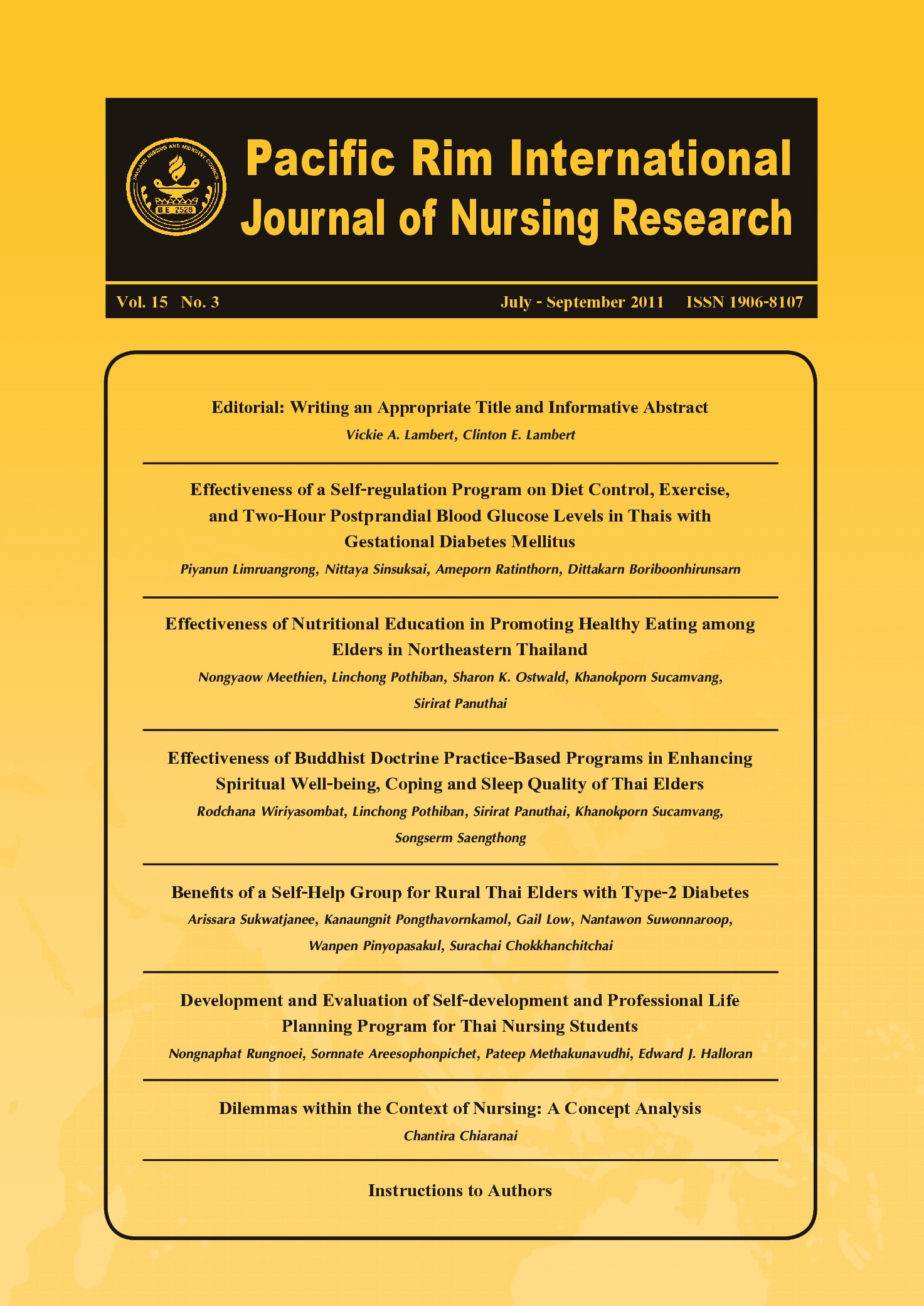Effectiveness of Buddhist Doctrine Practice-Based Programs in Enhancing Spiritual Well-being, Coping and Sleep Quality of Thai Elders
Keywords:
หลักพุทธธรรม, ความผาสุกทางจิตวิญญาณ, การเผชิญปัญหา, คุณภาพการนอนหลับ, ผู้สูงอายุไทย, Buddhist doctrine-based programs, Spiritual well-being, Coping, Sleep quality, Thai eldersAbstract
บทคัดย่อ
ความผาสุกทางจิตวิญญาณ เป็นองค์ประกอบที่สำคัญยิ่งของมนุษย์ เนื่องจากส่งผลต่อ ความผาสุกทางด้านร่างกายและจิตใจของบุคคล การศึกษานี้ใช้วิธีการวิจัยแบบทดลองเพื่อศึกษา ประสิทธิผลของโปรแกรมการปฏิบัติตามหลักพุทธธรรม ในการส่งเสริมความผาสุกทางจิตวิญญาณ การเผชิญปัญหาและคุณภาพการนอนหลับของผู้สูงอายุไทย กลุ่มตัวอย่างเป็นผู้สูงอายุในชุมชน 2 แห่ง ของอำเภอหาดใหญ่ จังหวัดสงขลา ที่นับถือศาสนาพุทธ อายุตั้งแต่ 60 ปีขึ้นไป ที่มีคุณสมบัติตามเกณฑ์ ที่กำหนด จำนวน 79 ราย กลุ่มตัวอย่างถูกสุ่มเข้ากลุ่ม 3 กลุ่ม กลุ่มที่ 1 ปฏิบัติสมาธิวิปัสสนากรรมฐาน 31 ราย กลุ่มที่ 2 ปฏิบัติสวดมนต์ 23 ราย และกลุ่มที่ 3 เป็นกลุ่มที่ไม่ได้รับโปรแกรมใดๆ 25 ราย รวบรวมข้อมูลก่อนและหลังการได้รับโปรแกรม 1 เดือน 2 เดือน และ 4 เดือน โดยใช้แบบวัดความผาสุก ทางจิตวิญญาณของผู้สูงอายุไทย แบบวัดการเผชิญปัญหาของผู้สูงอายุไทย และแบบวัดคุณภาพการ นอนหลับของผู้สูงอายุไทย ดัดแปลงโดยผู้วิจัยซึ่งได้ผ่านการทดสอบคุณภาพแล้ว วิเคราะห์ข้อมูลโดยใช้ สถิติบรรยายและการวิเคราะห์ความแปรปรวนแบบวัดซ้ำ
ผลการวิจัยพบว่า ในกลุ่มที่ปฏิบัติสมาธิวิปัสสนากรรมฐานมีความผาสุกทางจิตวิญญาณดีกว่า ก่อนเข้าร่วมโปรแกรมในระยะ 1 เดือน 2 เดือน และ 4 เดือน ในขณะที่กลุ่มปฏิบัติสวดมนต์ มีความผาสุก ทางจิตวิญญาณหลังเข้าร่วมโปรแกรมดีกว่าก่อนเข้าร่วมโปรแกรมในระยะ 2 เดือน และ 4 เดือน และ ดีกว่ากลุ่มควบคุมในเดือนที่ 4 อย่างมีนัยสำคัญทางสถิติ นอกจากนี้การเผชิญปัญหาของผู้สูงอายุไทย กลุ่มปฏิบัติสมาธิวิปัสสนากรรมฐานและกลุ่มปฏิบัติสวดมนต์ ภายหลังเข้าร่วมโปรแกรมทุกช่วงเวลาดีกว่า ก่อนเข้าร่วมโปรแกรม และดีกว่ากลุ่มควบคุมอย่างมีนัยสำคัญทางสถิติ ส่วนคุณภาพการนอนหลับทั้งใน กลุ่มปฏิบัติวิปัสสนากรรมฐานและกลุ่มปฏิบัติสวดมนต์ดีกว่ากลุ่มควบคุมเฉพาะภายหลังเข้าร่วมโปรแกรม ในเดือนที่ 4 เท่านั้น
ผลจากการศึกษาครั้งนี้ เป็นข้อมูลพื้นฐานสำหรับพยาบาลในการนำโปรแกรมการปฏิบัติ วิปัสสนากรรมฐานและการปฏิบัติสวดมนต์ไปปรับใช้ เพื่อส่งเสริมความผาสุกทางจิตวิญญาณ การเผชิญ ปัญหา และคุณภาพการนอนหลับในผู้สูงอายุไทย ข้อเสนอแนะสำหรับการวิจัยครั้งต่อไป ได้แก่ การศึกษา ในโรคเรื้อรังกลุ่มต่างๆ และในกลุ่มตัวอย่างที่มีขนาดใหญ่ เพื่อให้ผลการวิจัยสามารถอ้างถึงประชากร ผู้สูงอายุไทยได้
คำสำคัญ : หลักพุทธธรรม, ความผาสุกทางจิตวิญญาณ, การเผชิญปัญหา, คุณภาพการนอนหลับ, ผู้สูงอายุไทย
Abstract
Spiritual well-being is a major component of human life as it affects one’s physiological and psychological well-being. Thus, this randomized control trial aimed to investigate the effectiveness of Buddhist doctrine-based programs in enhancing spiritual well-being, coping and sleep quality of Thai elders.
A sample of 79 Buddhist Thai elders, residing in two rural communities in southern Thailand, was randomly assigned to three groups: Group I (n = 31) practiced Vipassana meditation; Group II (n = 23) practiced chanting; and, Group III (n = 25), the control group, did not practice either Vipassana meditation or chanting. Data were collected on all subjects, before entering the program, and at one, two and four months after Groups I and II completed their intervention program, through use of the: Demographic, Family Status and Religious Experiences Data Sheet; Thai Elderly Spiritual Well-being Scale; Thai Elderly Coping Scale; and, Thai Elderly Sleep Quality Scale. Data were analyzed using descriptive statistics, one-way ANOVA, repeated measures ANOVA, the Kruskal-Wallis test and the Bonferroni test.
Results revealed elders who practiced Vipassana meditation demonstrated significantly better spiritual well-being at one, two and four months after completing their intervention. Those who practiced chanting showed a significant increase in spiritual well-being, only at two months and four months after completing their intervention. The control group demonstrated no significant changes over the three measurements. Although all three groups revealed significant changes in coping, at various times over the three measurements, both the Vipassana meditation group and the chanting group showed better coping than the control group. Regarding sleep quality, both the Vipassana meditation and chanting group, compared to the control group, demonstrated significant increases in sleep quality four months after completing their invention. The study’s findings suggest nurses can use Vipassana meditation and chanting as potential enhancements to spiritual well-being, coping and sleep quality of Thai elders.
Keywords : Buddhist doctrine-based programs, Spiritual well-being, Coping, Sleep quality, Thai elders
Downloads
How to Cite
Issue
Section
License
Copyright: The Pacific Rim International Journal of Nursing Research, Thailand Nursing & Midwifery Council has exclusive rights to publish, reproduce and distribute the manuscript and all contents therein.








.png)



